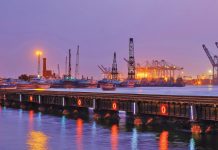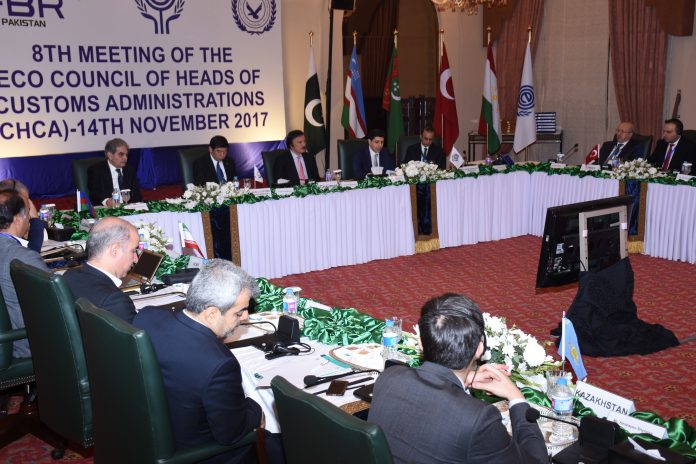ISLAMABAD: Special Assistant to Prime Minister on Revenue Haroon Khan has said Pakistan holds a very important strategic position on the world map due to its proximity to China, Russia and India and “we can become the gateway to Central Asia for oil and energy trade”.
“Our close ties with all Muslim countries and the Middle Eastern economies cannot be understated,” he said in his address to the inaugural session of the 8th meeting of the ECO (Economic Cooperation Organisation), to the heads and customs administration held at a local hotel today.
He said ECO countries together formed a geo-politically important block. “Turkey bridges the continents of Europe and Asia while Iran is situated at the crossroads of Central Asia, South Asia and the Middle East. Similarly, the Central Asian Republics of Azerbaijan, Kazakhstan, Kyrgyzstan, Tajikistan and Uzbekistan were uniquely located on the Silk Road and Energy Corridor connecting the giant economies of China and Russia to rest of the world.”
World Customs Organisation Secretary-General Dr Kunio Mikuriya, Economic Cooperation Organisation (ECO) Azerbaijan Deputy Secretary-General Kanan Nazarov, State Customs Committee of the Republic of Azerbaijan Chairman Aydin Aliyev, Islamic Republic of Iran Customs Administration Head Forood Asgari, State Revenue Committee of the Republic of Kazakhstan International Cooperation Division Chief Expert Kenbayev Shyngys, Republic of Tajikistan Customs Service Deputy Head Azim Tursunzoda, Republic of Turkey Ministry of Customs and Trade Deputy Undersecretary Sezai UCARMAK, FBR Chairman Tariq Mahmood Pasha and senior officials of Pakistan Customs Service were also present.
Referring to the latest ECO Statistical Report, Haroon Khan said the share of the ECO in the global trade was almost 2 per cent as against ECO region’s population of 6.2 per cent in the world population. “We can see from these numbers that we have a tremendous opportunity to grow and reach our maximum potential,” he said.
He called for simplification of customs procedures for ease of trade, calling it an important step for enabling the economic integration of ECO members. “We must benefit from the existing agreements signed by ECO countries, especially ECO Transit Trade Agreement, ECO Trade Agreement, MOU between World Customs Organisation (WCO) and ECO, MOU on cooperation against smuggling and customs frauds among ECO countries and transit trade framework agreement.”
He said Pakistan Customs was committed to working closely with the ECO and WCO on adoption of international best practices through enhanced representation and Pakistan had already moved ahead on this front by issuing its rules for the implementation of Transports Internationaux Routiers Convention, commonly known as TIR Convention on International Transport of Goods Under Cover of TIR Carnets. “This will surely help in promoting ECO regional trade,” he added.
Haroon Khan called for taking advantage of the existing MOU between WCO and ECO to maximise the benefits for capacity building, enforcement operations and joint exercises and “we should also benefit from the ECO agreement on mutual administrative assistance in customs matters in order to share information”. “Electronic Data Interchange (EDI) is an important instrument of cooperation in this age of fast communication and the paperless world. This can assist the Customs Administrations to share vital information to facilitate the legitimate trade.”
The special assistant to PM on revenue also offered Pakistan to become a regional training hub for ECO countries in all the relevant areas of customs cooperation. “The existing facility of the Directorate General of Training and Research of Customs in Karachi can be effectively utilised to conduct training courses from the perspective of both Enforcement and Trade Facilitation. A pool of our already accredited trainers by World Customs Organisation can provide these trainings. This centre can provide our colleagues from Central Asian countries, which do not have a port, a unique experience at a seaport and to observe modalities of transit trade.”
Highlighting the economic gains and achievements of recent years, Haroon Khan told the delegates that Pakistan has done fairly well in attaining macroeconomic stability. “Our inflation is at a historical low of around 4 per cent. Our GDP growth was 5.3 per cent last year. We are well on our way to achieve the 6 per cent mark this year. Our central bank policy rate is at 5.75 per cent, one of the lowest in our history. Our fiscal deficit remains under 6 per cent. Our currency is stable. Our stock market has gone up from under 19,000 to over 41,000 in a short period of four years. Our power shortage problem is soon to be a thing of the past with thousands of megawatts coming online. Our gas shortage is being covered by imported Liquefied Natural Gas (LNG). We have also successfully ended a three year IMF programme last year.”
He also noted Pakistan’s contribution in the fight against terrorism, saying “We not only fought for our own country but also fought this battle for the rest of the world. Pakistan has been the frontline state in this war. We sacrificed lives of thousands of military and paramilitary soldiers and the lives of tens of thousands of civilians. The economic losses were more than $ 100 billion. Yet we have proved once again that we are a resilient nation.”
In the end, Haroon Khan thanked the delegates for their active participation and hoped they would take home further inspiration on how to foster the necessary changes. He also expressed gratitude to all the guests for coming to Pakistan and “giving us this unique opportunity to host the delegates of ECO nations”.

























